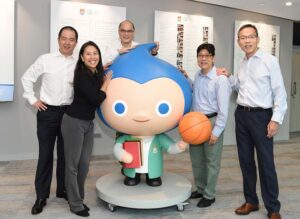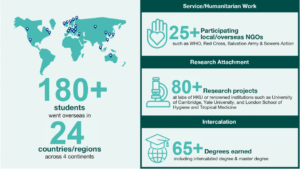e-News
University’s Teaching Excellence Awards 2019 - Teaching Innovation Award (Team)
University’s Teaching Excellence Awards 2019 - Teaching Innovation Award (Team)

(From left to right) Professor Gilberto Leung, Dr Julie Chen, Dr Gordon Wong , Dr George Tipoe and Professor CS Lau (Leader) of the Li Ka Shing Faculty of Medicine for Re-imagining Medical Education: An Enrichment Year in the Core MBBS Curriculum
Website about the Enrichment Year: https://www.med.hku.hk/en/Teaching-and-Learning/Undergraduate-Studies/Enrichment-Year
Where do you find your “ideas”?
Prof CS Lau: How to make the best use of the ‘extra year’ that was afforded to the medical programme since the 2012 territory-wide education reform was always one of the Teaching Deanery’s agenda. In 2012, we developed new Special Study Modules and allowed students semester long elective periods. While it was an improvement allowing students to learn beyond medicine, as well as to be more focussed during their electives, we felt the arrangements were still rather fragmented. Further changes were needed.
While the idea of an Enrichment Year did not happen out of the blue, the decision to move ahead with it came during a brainstorming meeting with the Dean one afternoon in March 2016. Besides enriching the students’ experience during that ‘extra year’, it was an opportunity for the faculty to perform a mini review of the curriculum. Through re-organising the time-table, we reviewed the relevance of the various body system blocks and teaching materials. In the process, we were able to reorganise the teaching blocks, streamline some of the teaching and remove those that were redundant.
What would you expect the students could benefit from EY?
Prof CS Lau: Our mission as educators in medicine is to help our medical students define opportunities that optimizes their learning experience and enrich them both intellectually and personally. To empower medical students to learn beyond a structured medical curriculum, our team implemented the first-of-its-kind credit bearing Enrichment Year (EY) programme in the third year of the 6-year-MBBS studies in HKU Medicine.
EY allows the time and space for students to broaden their knowledge and horizon where they see options of medical practitioners integrating medical knowledge in cutting-edge clinical research for improvement of patient care and performing frontier humanitarian medical work with NGOs in offering the much needed medical care to the disadvantaged. By and large, EY is an opportunistic time to better equip oneself as a communicator, collaborator, scientist, health care advocate and educator for the modern society through new stimulations in intellectual exchange and cultural endeavors. In addition, the EY curriculum is very much in line with the University’s 6 educational aims.
Prof Gilberto Leung: I think the greatest impact on students is the holistic development of them as learners, professionals and citizens through exposure to and participation in other life experiences, challenges and learning environment. They can in turn bring to the rest of the world, both locally and globally, this HKUMed teaching and learning philosophy and practices – that the training of future medical professionals should encompass more than just the acquisition of skills and knowledge.
How do you encourage students to make an impact both locally and globally?
Prof CS Lau: To me, our students are highly intelligent and motivated. So it is not about encouraging them to make an impact but to facilitate their learning with guidance and support! The EY allows students to expand their scope in 3 main areas – service learning which provides a better understanding of humanities; research studies which allow students to have deeper appreciation of medical sciences; and articulation to other studies. Students can pick one or two of these areas and have the freedom to pursue them locally or abroad.
One of the key elements of the EY is students are given the initiatives to decide what and where they want to learn during one year. Besides the various programmes that are being coordinated by the Faculty, students would approach universities and other learned institutions, as well as NGO’s directly for learning opportunities. This experience alone will stand them in good stead when they qualify.
What has been the greatest challenges in the process of developing this innovative curriculum?
Prof CS Lau: A lot of efforts were needed to bring about the new curriculum but I do not view them as challenges. In a way, it was a good learning opportunity for the team. In fact, through this, Dr Julie Chen and others have managed to secure a major UCG T&L research grant. Julie can supplement. The EY curriculum is a dynamic and continuous development. It ensures the Faculty to keep reviewing what is best for our students.
Prof Gilberto Leung: The greatest challenge to the Faculty in this particular time is of course COVID-19 and its impact on traveling and the engagement of other institutions as a global learning platform.
Could you give some valuable suggestions for other teachers if they want to be innovative in their teaching?
Prof CS Lau: Do not fear experimentation, in science or in T&L, as long as the objective is correct and the will is there to just do it.
In a way, the EY curriculum is still very young and we are still learning how to perfect the system. But like any experiments, the very positive outcomes that we have achieved so far have been most encouraging!
